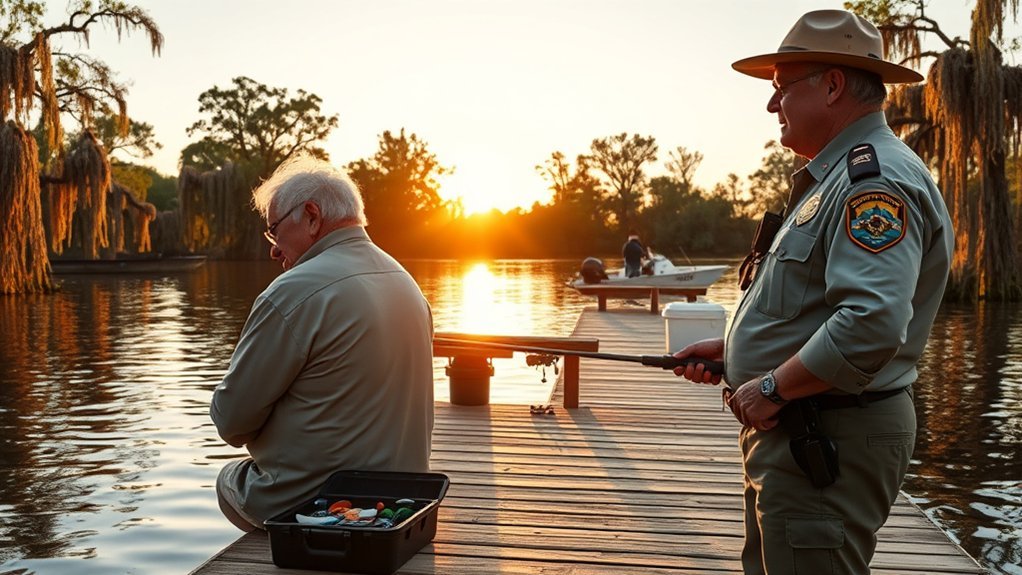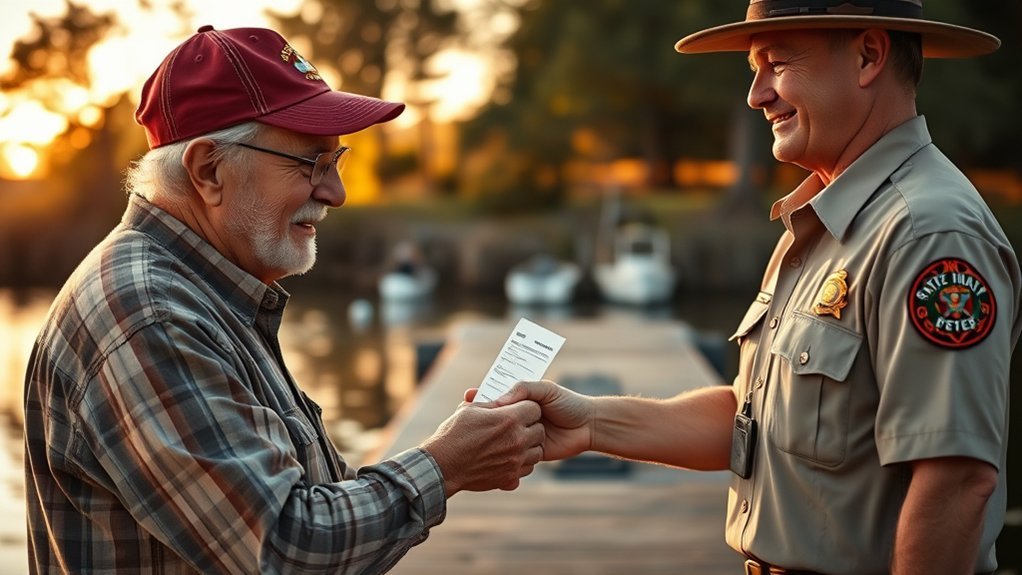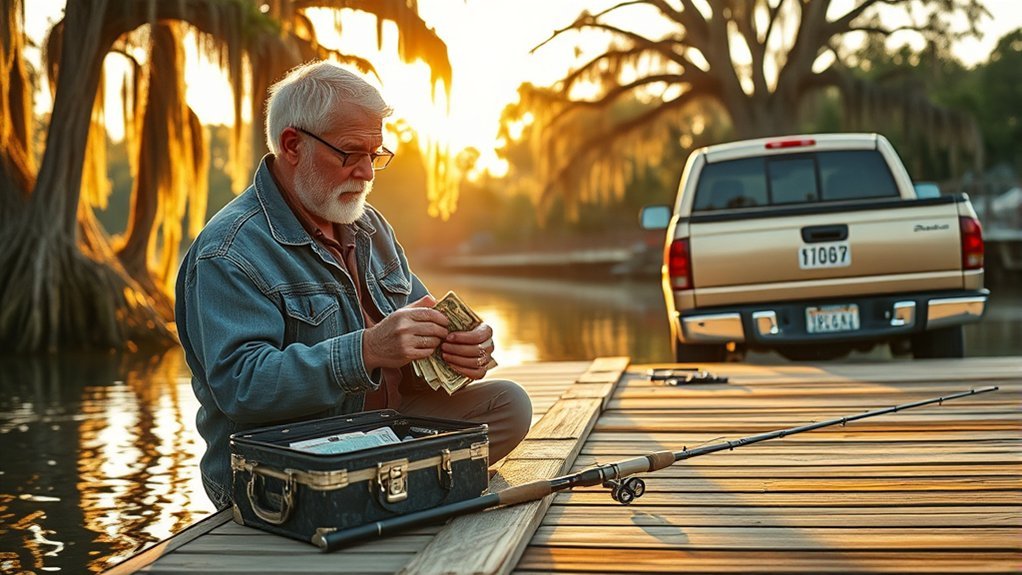If you live in Alabama and you’re 65 or older, you can fish public freshwater and saltwater without buying a standard fishing license. You must carry proof of age and Alabama residency when you fish.
In Alabama, residents who are 65+ don’t have to buy a freshwater or saltwater fishing license. Bring an Alabama driver’s license or other proof of age and residency. You still follow all fishing rules, and saltwater anglers must also sign up each year for the free Saltwater Angler Registry.
Key takeaways
- Age 65+ and Alabama residency are both required.
- Carry ID every trip. If you can’t prove you qualify, you can be cited.
- Saltwater trips still require the free Saltwater Angler Registry (SWAR) each year. Some trips also require extra privileges.
Who qualifies
- Alabama resident (as defined by the state’s residency rules).
- Age 65 or older.
If you are a nonresident, the senior exemption does not apply. Nonresidents age 16+ generally need an Alabama fishing license to fish public waters.

Different rule: Alabama residents can fish from the bank in their own county with ordinary hook and line without buying a license. You still need proof of Alabama residency.
Proof to carry
The simplest proof is an Alabama driver’s license or Alabama non-driver ID. It shows your birth date and that you live in Alabama. If you don’t have an Alabama-issued ID, Alabama publishes a list of other documents that may be used to prove residency through the state’s process (for example, certain tax, property, insurance, or utility records). See Alabama’s official residency requirements for details.
| Need to prove | Common proof |
|---|---|
| Age | Government ID with date of birth (Alabama license/ID is easiest). |
| Residency | Alabama license/ID; or other approved documents for resident non-drivers. |

Rules that still apply
The exemption only removes the need to buy a standard license. It does not change fishing laws. You still follow:
- Seasons and closed areas.
- Size limits and creel (bag) limits.
- Legal gear and methods.
Freshwater
Eligible seniors don’t need to buy a freshwater license. The bank-fishing rule in your home county may also apply when you fish from the bank with ordinary hook and line.
Saltwater
Eligible seniors don’t need to buy a saltwater license, but they still must sign up each year for the free Saltwater Angler Registry (SWAR). Seniors also are not exempt from certain privileges required of all anglers, such as the SW Reef Fish Endorsement (for Gulf reef fish) and the spearfishing privilege.
For help matching your trip to the right license, registry, and privileges, use the state’s license FAQs and check current regulations before you go.
Charter and party boats
If you’re fishing on a commercial party boat (headboat) that holds the proper Alabama boat license, passengers may be covered for saltwater licensing. On other charters, coverage can vary. Bring your ID anyway, and ask the operator what registry sign-ups or endorsements you need for the fish you plan to target.
Related exemptions and low-cost options
- Active-duty Alabama residents home on leave: may fish without buying a license, but must carry proof of leave.
- Nonresident college students (ages 17–23): may qualify to buy resident licenses through a residency exception process.
- Disabled and veterans licenses: Alabama offers low-cost disabled fishing licenses for qualifying residents.
- Optional 65+ licenses: Optional annual or lifetime licenses are available if you want a license record even though you’re exempt.
Penalties
If you fish without the required license, registry, or privileges—or if you can’t prove you qualify for an exemption—you can be cited. Alabama’s published minimum fine schedule includes:
| Violation | Minimum fine |
|---|---|
| Fishing without a license (resident ages 16–65) | $50 |
| Fishing without a license (nonresident, age 16+) | $100 |
| Lending/borrowing or altering a license | $250 |
| False statement to obtain a license | $250 |
FAQs
Do Alabama residents over 65 need a fishing license?
No. Residents age 65+ are exempt from buying standard freshwater and saltwater fishing licenses, but they must carry proof of age and Alabama residency while fishing.
Do seniors need the Saltwater Angler Registry?
Yes. Alabama requires the Saltwater Angler Registry for residents 16+ who are not required to buy an annual saltwater license, including many anglers age 65+.
Can I bank fish in my home county without a license?
Often, yes. Alabama residents may fish from the bank in their county of residence with ordinary hook and line without buying a license, but you must have proof of Alabama residency and follow all fishing rules.
Are nonresident seniors exempt from Alabama fishing licenses?
No. Nonresidents age 65+ generally must purchase the appropriate Alabama fishing license to fish public waters.
Do charter boat passengers need their own Alabama saltwater fishing license?
Usually not. Passengers on a properly licensed Alabama commercial party boat may fish without buying an Alabama saltwater fishing license, but required registry sign-ups or endorsements can still apply to your trip.
What can I use to prove Alabama residency?
An Alabama driver’s license or Alabama non-driver ID is the simplest proof. For resident non-drivers, Alabama lists other documents that may be used to establish residency through the state’s process.
Bottom line: If you’re an Alabama resident age 65+, carry proof, follow all fishing rules, and don’t skip the Saltwater Angler Registry for saltwater.


